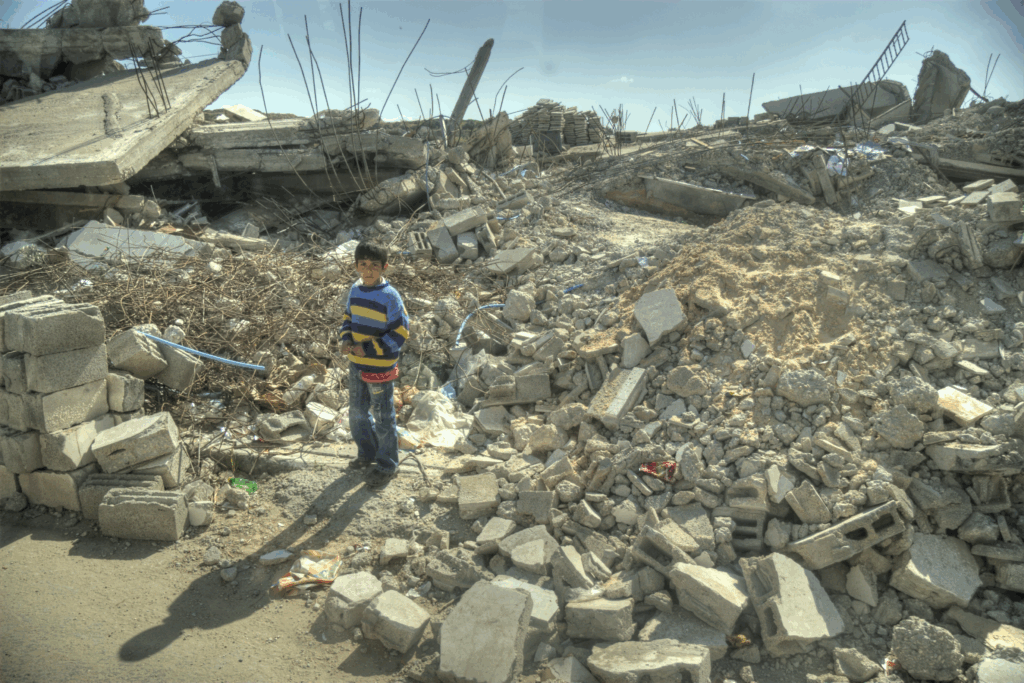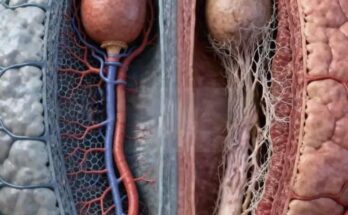As trucks delivering relief entered Gaza from Rafah, videos have surfaced that allegedly show hundreds of Palestinians scurrying for food.
Turkish outlet shares footage According to reports, after the Israeli soldiers halted fighting to allow aid deliveries, TRT captured individuals scrambling into cars.
Foreign countries and international relief organizations have condemned Israel, blaming it for the escalating humanitarian situation.
Israel has strongly condemned the idea. As local officials reported more deaths from malnutrition, Benjamin Netanyahu emphasized on Sunday that Israel is not using famine as a cynical tactic and disputed that there is starvation in Gaza.
As supplies started to pour into the besieged enclave, the Israeli prime minister told a conference in Jerusalem, “There is no policy of starvation in Gaza and there is no starvation in Gaza.”

As part of efforts to allow the humanitarian flow, the IDF yesterday established ten-hour daily restricted pauses in three populous areas of Gaza.
Israel reported today that on the first day of the partial halt, the United Nations and other assistance organizations had delivered over 120 truckloads of food aid.
Nevertheless, Israel is still under pressure after the World Health Organization (WHO) called the situation “man-made mass starvation.”
The UK and 27 other nations supported the viewpoint, denouncing Israel’s aid delivery approach as depriving Gazans of their “human dignity.”
Journalists and human rights organizations in the Gaza Strip have also insisted that their staff members are currently in danger of famine.
The United Nations relief coordinator, Tom Fletcher, stated that he anticipated the pauses to last “a week or so,” which he expressed was “clearly insufficient” given the magnitude of the “atrocity.”
He stated on the BBC’s Today Programme that they had difficulties delivering aid to Gaza because “starving” population were aware of the delivery routes.
“Most of the lorries” on Sunday had flour taken off them by desperate civilians, he said.The people of Gaza got “quite a bit of food in” yesterday, but “lots of that got looted,” he said.‘Make or break’ days are coming for Gaza, he said.
Mr Fletcher said the UN welcomed “Israel’s decision to support a one-week scale-up of aid, including lifting customs barriers on food, medicine and fuel from Egypt and the reported designation of secure routes for UN humanitarian convoys.”
Citing preliminary reports showing that more than 100 truckloads of relief were collected, he stated that certain movement restrictions seemed to have been loosened on Sunday.
“But we need sustained action, and fast, including quicker clearances for convoys going to the crossing and dispatching into Gaza; multiple trips per day to the crossings so we and our partners can pick up the cargo; safe routes that avoid crowded areas; and no more attacks on people gathering for food.”
Although the UN relief director emphasized that “vast amounts of aid are needed to stave off famine and a catastrophic health crisis,” he acknowledged that the world was urging for life-saving humanitarian assistance to reach its destination
“Ultimately of course we don’t just need a pause – we need a permanent ceasefire,” he added.At least 63 individuals were reported dead throughout Gaza during Sunday’s pause.
An airstrike struck a designated safe area in Gaza City, according to a reporter for Al Jazeera in Gaza. According to locals, a bakery was the target.
In the last 24 hours, 14 Palestinians, including two infants, have perished in Gaza from malnutrition-related reasons, according to the Palestinian health ministry.
According to the UN’s World supplies Programme (WFP), the corridors and pauses should enable the safe delivery of humanitarian supplies.
“Food aid is the only real way for most people inside Gaza to eat,” it said in a statement.
According to the report, 470,000 people in Gaza “are enduring famine-like conditions” that are causing deaths, and a third of the population had gone days without eating.
Additionally, it stated that it has enough food in the area or its route to the area to sustain the 2.1 million residents of the Gaza Strip for about three months.
‘Thousands of Palestinians seeking food’ were reportedly seen mounting assistance trucks in Rafah’s Morag corridor on Saturday, prior to the pause taking effect, according to scenes from Gaza.
Separate video purportedly showed demonstrators attempting to prevent help from reaching Gaza in the early hours of July 28.
As the occupying force in Gaza, Israel is required to make sure the people have access to enough food, according to UN rights chief Volker Turk.
“Children are starving and dying in front of our eyes. Gaza is a dystopian landscape of deadly attacks and total destruction,” he said in a statement.
The IDF said that allowing a “tactical pause in military activity” to allow humanitarian aid in would “refute the false claim on international starvation.”These were scheduled to occur in densely populated areas of Gaza City, Deir al-Balah, and Muwasi from 10 a.m. to 8 p.m.
Al Qahera News TV, which is associated with the Egyptian government, reported on Sunday that relief trucks had begun traveling from Egypt to Gaza.
According to the Al Qahera correspondent, dozens of trucks loaded with tons of humanitarian aid made their way to the Karam Abu Salem (Kerem Shalom) border in southern Gaza.
Israel claimed it started airdropping aid into Gaza on Saturday and was taking a number of additional actions to alleviate the humanitarian situation there.
However, an increasing number of voices are calling on Israel to do more to guarantee the prompt and complete delivery of relief to the civilian population in Gaza.
In a first for Israeli NGOs, rights organizations B’Tselem and Physicians for Human Rights Israel declared on Monday that they had come to the conclusion that the conflict in Gaza amounts to a “genocide” against Palestinians.
B’Tselem described Israel’s conduct in the war as “a clear and explicit attempt to destroy Palestinian society in Gaza and create catastrophic living conditions that prevent the continued existence of this society in Gaza”, adding: “That is precisely the definition of genocide.”
The group’s 79-page report concluded that senior decision makers had “expressed genocidal intent throughout” the war. It also accused state leaders, “particularly in Europe and the US”, of “enabling…genocide.”
“Nothing prepares you for the realisation that you are part of a society committing genocide. This is a deeply painful moment for us,” said B’Tselem executive director Yuli Novak.
David Mencer, a spokesperson for the Israeli prime minister’s office, condemned the accusation.“We have free speech here in Israel but we strongly reject the accusation,” he said.“Our defence forces target terrorists and never civilians. Hamas is responsible for the suffering in Gaza.”
More than 100 mostly relief and rights organizations demanded last Wednesday that all limitations on the flow of aid be lifted and urged other governments to do more to assist the Gaza population.
“As the Israeli government’s siege starves the people of Gaza, aid workers are now joining the same food lines, risking being shot just to feed their families.”
“With supplies now totally depleted, humanitarian organisations are witnessing their own colleagues and partners waste away before their eyes,” the organisations said.
“The Government of Israel’s restrictions, delays, and fragmentation under its total siege have created chaos, starvation, and death.”
Due to a lack of aid, doctors working in the strip said that many Palestinians have perished from starvation in recent days.And France’s Agence France-Presse (AFP) news agency warned last week its journalists “might die of hunger”, urging Israel to allow reporters to leave.Israel claims that Hamas is leveraging a ‘famine narrative’ in ceasefire negotiations.
A cynical ‘lack of desire to reach a truce’ from Hamas was implied when Israel and the United States announced last week that they were abandoning the Doha negotiations.
Incredulously, Hamas retorted that it did wish to pursue further talks.Israel has stated that it will not consent to a ceasefire unless Hamas disarms and cedes control of Gaza. Hamas claims it is prepared to relinquish its weapons but not its authority.
The return of the hostages being held by Hamas and a durable peace are now no closer for the people of Israel and Gaza.Israel has consistently insisted that the humanitarian crisis in Gaza is not its fault.
However, its non-US partners are saying more and more that Israel needs to fulfill its responsibilities under international humanitarian law and that civilians are starving.
Up until now, Israel had financed the Gaza Humanitarian Foundation (GHF), a private humanitarian organization supported by the United States.
However, the UN’s revelation that Israeli soldiers had killed over 1,000 Palestinians seeking food supplies, primarily in the vicinity of the distribution stations, put pressure on the mission as well.
Israel claimed that Hamas was causing mayhem close to the relief locations. It said that its soldiers don’t intentionally shoot civilians and that they had merely fired warning bullets.The GHF defended their distribution scheme by accusing Hamas of widespread assistance theft.
However, an internal U.S. government report published last week cast doubt on the primary justification offered by Israel and the United States for supporting the relief effort, finding no proof of systematic theft by Hamas of U.S.-funded humanitarian supplies.



